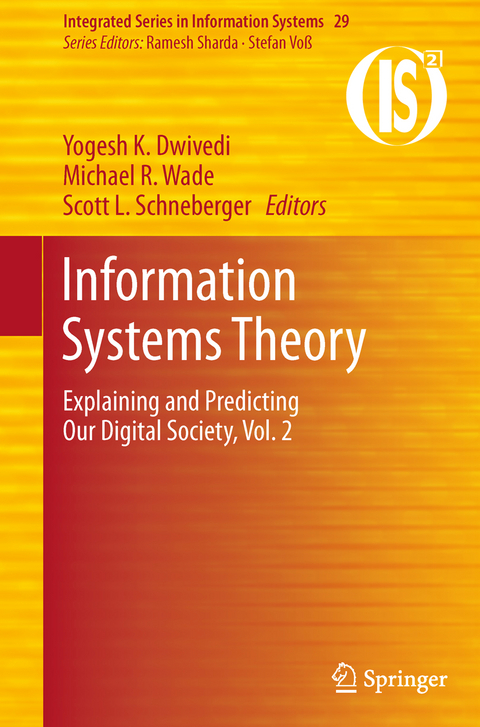Information Systems Theory
Springer-Verlag New York Inc.
978-1-4419-9706-7 (ISBN)
The overall mission of this book is to provide a comprehensive understanding and coverage of the various theories and models used in IS research. Specifically, it aims to focus on the following key objectives:
To describe the various theories and models applicable to studying IS/IT management issues.
To outline and describe, for each of the various theories and models, independent and dependent constructs, reference discipline/originating area, originating author(s), seminal articles, level of analysis (i.e. firm, individual, industry) and links with other theories.
To provide a critical review/meta-analysis of IS/IT management articles that have used a particular theory/model.
To discuss how a theory can be used to better understand how information systems can be effectively deployed in today’s digital world.
This book contributes to our understanding of a number of theories and models. The theoretical contribution of this book is that it analyzes and synthesizes the relevant literature in order to enhance knowledge of IS theories and models from various perspectives. To cater to the information needs of a diverse spectrum of readers, this book is structured into two volumes, with each volume further broken down into two sections.
The first section of Volume 1 presents detailed descriptions of a set of theories centered around the IS lifecycle, including the Success Model, Technology Acceptance Model, User Resistance Theories, and four others. The second section of Volume 1 contains strategic and economic theories, including a Resource-Based View, Theory of Slack Resources, PortfolioTheory, Discrepancy Theory Models, and eleven others.
The first section of Volume 2 concerns socio-psychological theories. These include Personal Construct Theory, Psychological Ownership, Transactive Memory, Language-Action Approach, and nine others. The second section of Volume 2 deals with methodological theories, including Critical Realism, Grounded Theory, Narrative Inquiry, Work System Method, and four others.
Together, these theories provide a rich tapestry of knowledge around the use of theory in IS research. Since most of these theories are from contributing disciplines, they provide a window into the world of external thought leadership.
Employing Personal Construct Theory to Understand Information Systems: A Practical Guide for Researchers.- Psychological Ownership and the Individual Appropriation of Technology.- Transactive Memory and its Application in IS Research.- The Language-Action Approach: Information Systems Supporting Social Actions.- A Review of the Organizational Information Processing Theory.- Scientia Potentia Est: Organizational Learning, Absorptive Capacity and the Power of Knowledge.- Applying Actor Network Theory and Managing Controversy.- Using Concepts from Structuration Theory and Consequence of modernity to Understand IS Deployment in Healthcare Setting.- Hubble Bubble Toil and Trouble: The Special Case of Emergency Services.- ERP Diffusion and Assimilation Using IT-Innovation Framework.- The Yield Shift Theory of Satisfaction and its Application to the IS/IT Domain.- Intention-based Models: The Theory of Planned Behavior within the Context of IS.- Understanding IS Theory: An Interpretation of Key IS Theoretical Frameworks using Social Cognitive Theory.- The Potential of Critical Realism in IS Research.- Grounded Theory and Information Systems: Are We Missing the Point?.- Developing Theories in Information Systems Research: The Grounded Theory Method Applied.- The Mikropolis Model: A Framework for Transdisciplinary Research of Information Systems in Society.- Inquiring Systems: Theoretical Foundations for Current and Future Information Systems.- Information Systems Deployment as an Activity System.- The Work System Method as an Approach for Teaching and Researching Information Systems.-
| Reihe/Serie | Integrated Series in Information Systems ; 29 |
|---|---|
| Zusatzinfo | XXVI, 446 p. |
| Verlagsort | New York, NY |
| Sprache | englisch |
| Maße | 155 x 235 mm |
| Themenwelt | Mathematik / Informatik ► Informatik ► Datenbanken |
| Mathematik / Informatik ► Informatik ► Netzwerke | |
| Mathematik / Informatik ► Mathematik ► Finanz- / Wirtschaftsmathematik | |
| Wirtschaft ► Allgemeines / Lexika | |
| ISBN-10 | 1-4419-9706-7 / 1441997067 |
| ISBN-13 | 978-1-4419-9706-7 / 9781441997067 |
| Zustand | Neuware |
| Haben Sie eine Frage zum Produkt? |
aus dem Bereich




